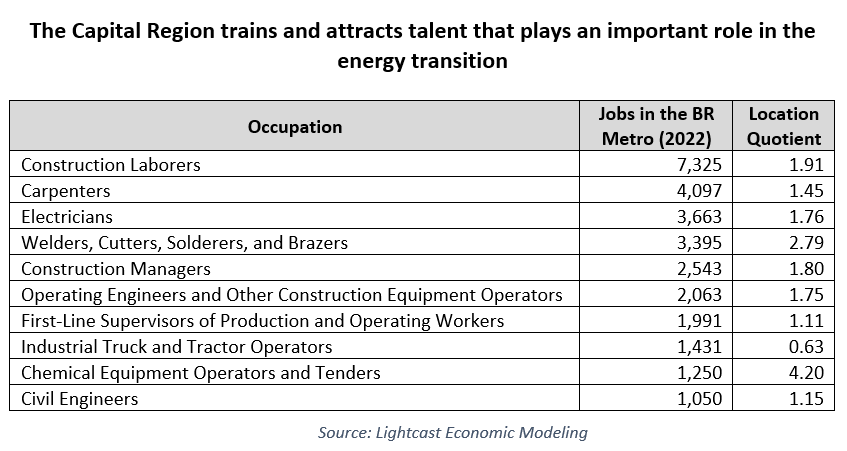Is Baton Rouge the Chemical Engineering Capital of the US?
The Capital Region's large, specialized labor force sets it up well to lead the global energy transition
The Bureau of Labor Statistics (BLS) estimates there are 470 chemical engineers in the Baton Rouge Metro. Chemical engineers, like the occupations listed in the table at the end of this report, are critical for companies working with carbon sequestration, hydrogen energy, and other transitional energy projects. This estimate from the BLS lags about thirteen months; some real-time estimates, such as those produced by the labor market analytics firm Lightcast, claim the BR Metro currently has up to 630 chemical engineers.
Regardless of the estimate used, chemical engineers are considerably less common than other engineering disciplines – the United States has just 20,000 chemical engineers compared to 182,000 electrical engineers, 278,000 mechanical engineers, and 308,000 civil engineers1.
Baton Rouge has the sixth-most chemical engineers of any metro in the country, and the location quotient for chemical engineers in Baton Rouge is 8.84, second-highest in the country2. Location quotients measure the “concentration of employed workers in a region relative to the national average3.” In other words, they can tell you how much more common a particular job is in Baton Rouge compared to similarly sized communities. This means that chemical engineers are almost nine times more common in Baton Rouge than the national average. Looking at the metros with the ten largest location quotients for chemical engineers, Baton Rouge has the second largest population.
For employers looking for chemical engineers, Baton Rouge offers the best of both worlds. Not only does Baton Rouge have a large, professional talent pool of chemical engineers, but the metro’s smaller size allows Baton Rouge to offer a below-average cost of living, something that can’t be said by most of the metros with large numbers of chemical engineers4. And compared to the smaller metros with similarly-large concentrations of chemical engineers, Baton Rouge has a larger labor force geared towards the energy transition, including thousands employed in skilled trades and other jobs included in the Department of Energy’s career mapping tool (which will be discussed later).
These conditions should persist because Baton Rouge’s workforce pipeline is set up well to replace its soon-to-be-retiring chemical engineers. Louisiana State University (LSU) has awarded more than 1,200 chemical engineering degrees in the last ten years, including more than 1,100 bachelor’s degrees5. As of the Spring 2023 semester, LSU had 420 students studying chemical engineering. And there’s data that shows that about 56% of LSU’s recent engineering graduates chose to work in Louisiana after graduation, putting LSU above many of the top engineering programs in the country in terms of its ability to keep engineers in-state after graduation6.
In short, Baton Rouge has a lot of chemical engineers with a lot more in the workforce pipeline. With or without the title “Chemical Engineering Capital of the US,” Baton Rouge has a lot to offer to companies interested in benefiting from the region’s large, specialized labor force.
Baton Rouge has large concentrations of other occupations demanded by the energy transition
The Department of Energy’s Office of Energy Efficiency & Renewable Energy has a helpful career mapping tool that helps prospective transitional energy workers understand the types of jobs and career ladders available to them. For economic developers like us, this tool helps us understand how to build a workforce pipeline that can supply local companies with the workers they need.
The Capital Region has thousands of workers in fields that the federal government projects will play a critical role in the energy transition, from entry-level laborers & operators to skilled trades workers to technical engineering positions that can require a master’s degree or higher.
Most of these occupations have an above-average location quotient in Baton Rouge, showing how the Metro punches well above its weight in terms of its ability to train and attract the talent that plays an important role in the energy transition.
The flurry of economic activity that Baton Rouge has seen in recent years around transitional energy projects is thanks to, in large part, the Metro’s skilled and specialized labor force. Baton Rouge’s competitive advantage when it comes to chemical engineers and other occupations sets the Capital Region up to be a global leader in the energy transition.
Bureau of Labor Statistics
Bureau of Labor Statistics
Lightcast
Council for Community and Economic Research
Louisiana State University Office of Budget and Planning
US Census Bureau Longitudinal Employer-Household Dynamics. Data shows the %age of bachelor’s degree engineering graduates from 2016 through 2018 who remained in that state for at least one year after graduation.







